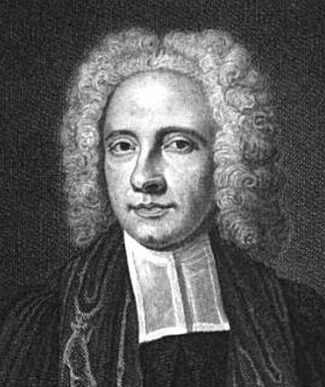
Daniel Waterland (1683-1740) was by all accounts the most important disputant of Samuel Clarke about the Trinity.
Waterland spent his career at Cambridge, where he rose through the ranks, eventually becoming Vice-Chancellor, and also serving as a Chaplain to the King, and as an Anglican clergyman in a number of cities.
He had a good reputation, and was an energetic, but normally cool-headed controversial/polemical writer (aganist Clarke, and other other theological topics, against other respected men), and he gained somewhat of a reputation in Anglican circles as a defender of catholic orthodoxy.
Many, including himself, contemplating his becoming a bishop, but in 1740 he died after complications, seemingly, from surgeries on an ingrown toenail in one of his big toes! He was survived by his wife of 21 years. (His only children were his books.)
I’d describe Waterland’s views on the Trinity as social, with a liberal dose of negative mysterianism. Like Clarke, he insists that his is the ancient catholic view, and much of the dispute concerns pre-Nicene fathers. Like Clarke, he wants to stick to those fathers and to the Bible, and takes a dim view of medieval theology.
About the pre-Nicene catholic “fathers,” I’d say both Clarke and Waterland somewhat bend the material to their own ends (I mean, they tend to see those authors as supporting their view, and being perhaps more uniform than they were), but I think Waterland bends the materials more. In his view, catholics had always believed the Three to be “consubstantial” in a generic sense, yet which, somehow, together with their differences of origin, makes them but one god. Like Swinburne and Clarke, he agrees that the Father is uniquely the “font of divinity.” He continually hammers Clarke with the claim that there’s no middle ground between the one Creator and all creatures.
In this series, I’ll examine the way he deals with some favorite unitarian proof-texts, which, unitarians think plainly assert the numerical identity of the Father with the one true God, Yahweh. According to Waterland, these unitarians are making a mistake like the one I made.
You [i.e. Clarke] next cite John 17:3, 1 Cor. 8:6, Eph. 4:6, to prove, that the Father is sometimes styled the only true God; which is all that they prove. But you have not shewn that he is so called in opposition to the Son, or exclusive of him. It may be meant in opposition to idols only, as all antiquity has thought; or it may signify that the Father is primarily, not exclusively, the only true God, as the first Person of the blessed Trinity, the Root and Fountain of the other two.
You observe that “in these and many other places, the one God is the Person of the Father, in contradistinction to the Person of the Son.”
It is very certain, that the Person of the Father is there distinguished from the Person of the Son; because they are distincly named: and you may make what use you please of the observation against the Sabellians, who make but one Person of the two. But what other use you can be able to make of it, I see not; unless you can prove this negative proposition, that no sufficient reason can be assigned for styling the Father the only God, without supposing that the Son is excluded.
…As to 1 Cor. 8:6, all that can be reasonably gathered from it, is, that the Father is there emphatically styled one God; but without design to exclude the Son from being God also: as the Son is emphatically styled one Lord; but without design to exclude the Father from being Lord also. Reasons may be assigned for the emphasis in both cases; which are too obvious to need reciting.
…observe… that the discourse there, v. 4, 5, is about idols, and nominal gods and lords, which have no claim or title to religious worship. These the Father and Son are both equally distinguished from: which may insinuate at least to us, that the texts of the Old or New Testament, declaring the unity and excluding others, do not exclude the Son, “by whom are all things…” (Daniel Waterland, A Vindication of Christ’s Divinity: Being A Defence of Some Queries, Relating to Dr. Clarke’s Scheme of the Holy Trinity [1719] in Van Mildert, ed. The Works of the Rev. Daniel Waterland, Vol. I., pp. 279-80, broken into shorter paragraphs, bold added)
Next time: Is he right about this?